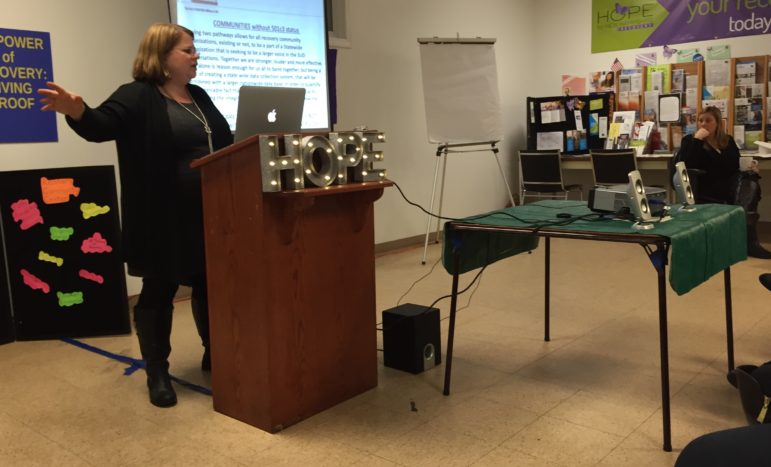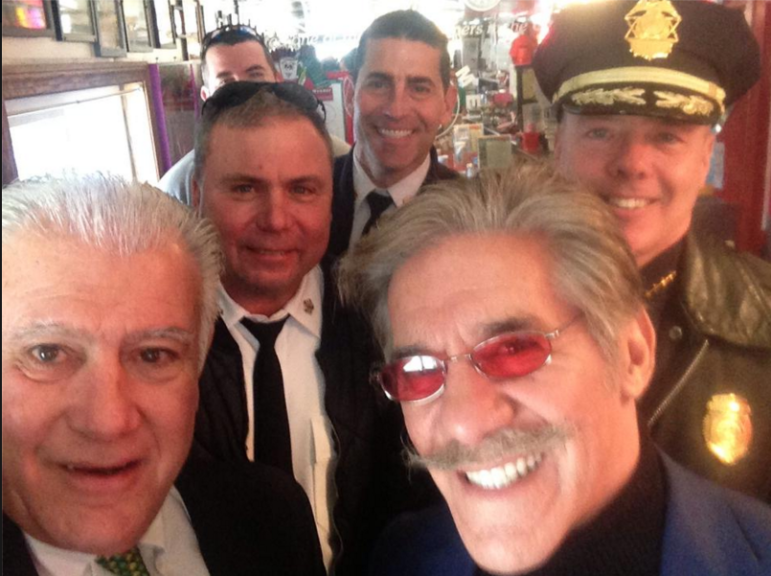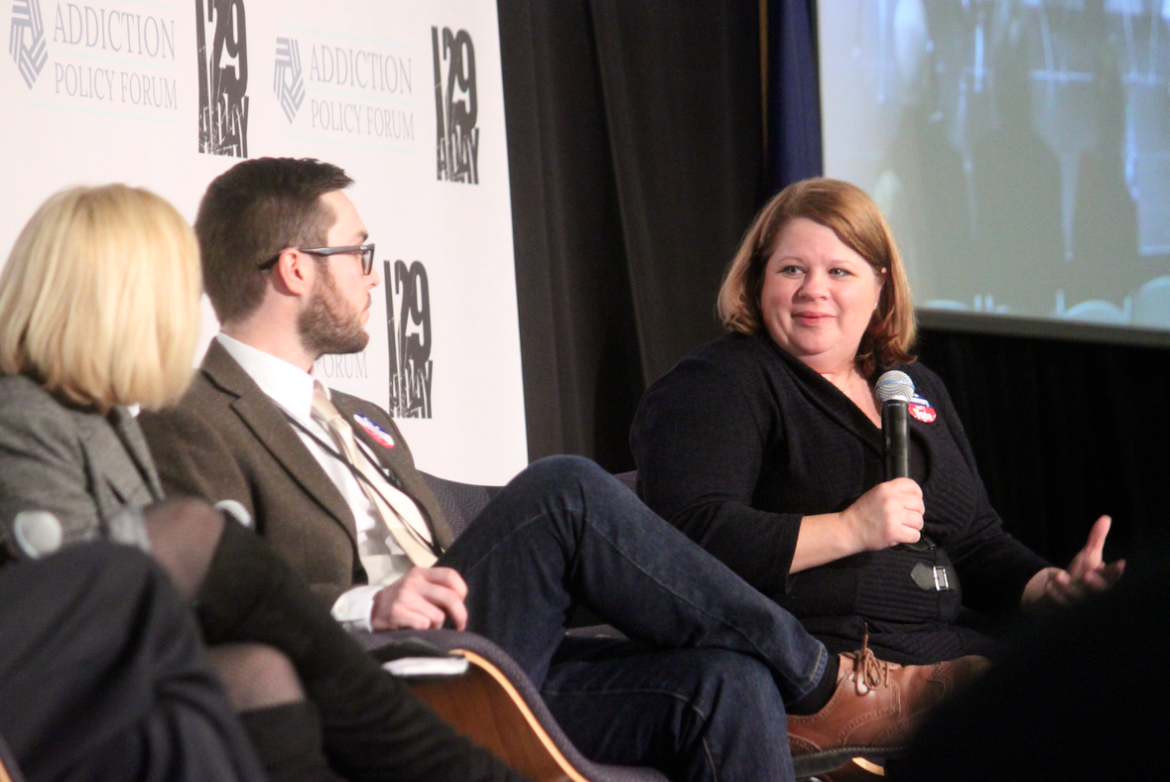
MANCHESTER, NH — A few weeks before the New Hampshire Primary, Geraldo Rivera landed in the Queen City for some fact-gathering for a story he was doing on our heroin scourge. It’s the “sleeper” issue of this presidential race, Rivera said in one of his social media posts. His story focused on the drug pipeline between Mexico and Manchester, and the uphill battle law enforcement faces.

Rivera took selfies with the mayor and our chiefs of police and fire. He stopped by the Red Arrow Diner, to chat up the waitresses about what they’ve seen and heard. He had a moment with Jack Riley, Deputy DEA Administrator, with whom Geraldo discussed the recent capture of Mexico’s drug kingpin El Chapo.
Geraldo even went to Concord to find out what New Hampshire’s elected officials are doing to stop the madness.
He likely left there feeling dazed and confused, as even our “state of emergency” over heroin hasn’t been enough for lawmakers to put aside their political differences and take swift action to save our children from death.
Manchester’s drug-addled reality has inspired HuffPo to dedicate an entire 12-minute episode of a multi-part documentary on how heroin is “bleeding into” the New Hampshire primary.
Heroin’s toll brought former presidential candidates Jeb Bush and Carly Fiorina out of the closet as parents of addicted children. It’s amplified the facts surrounding our heroin epidemic, which is a study in what happens when worlds collide:
- International heroin production: In Afghanistan and Mexico poppy fields and heroin production keep ramping up despite our government’s efforts – at least on paper – to stop it. Heroin has been readily available, flowing freely into the U.S. to satisfy the void left by the pharmaceutical company’s reformulation of oxy, which makes it too pricey to buy on the black market, and too hard for addicts to consume.
- Pharmaceutical profiteering: We have a booming pharmaceutical industry and a powerful PHARMA lobby in Washington that, together, continue to pocket and protect the huge profits still coming in annually for the highly-addictive opioids that hook many unsuspecting patients. The family that owns Purdue Pharma, manufacturer of oxycontin, made Forbes 2015 list of richest U.S. families, bumping the Rockefeller, Mellon and Busch families.
- DHHS says physicians who over-prescribe these drugs should know better, but still they are cited as the leading source to “at-risk” users.
Meanwhile, Holly Cekala, director of Hope for NH Recovery, missed out on the celebrity tour. While Geraldo was checking out the local diner fare, Cekala put on a big pot of coffee and invited 100 or so friends in recovery over to the Central Street community recovery center. They came, from Salem to Berlin, for an “exploratory meeting,” to find out exactly how Cekala has done what she’s done.
Because they want to do it, too.
What she’s done, since arriving in Manchester last summer, is activate a recovery underground with her street smarts and experience as someone in recovery herself. She’s about to help cut the ribbon on the state’s first comprehensive community recovery center in Manchester, fast-tracked only thanks to private investors. But they aren’t standing on ceremony, or waiting for the ribbon. Instead, they welcome walk-ins at the temporary peer center on Central Street, where the services are limited, but the compassion is genuine.
She’s been down a long and winding road that began with her own addiction to cocaine at the age of 25, incarceration, and a serious car wreck that broke her neck in six places — but activated her fighting spirit.

Cekala turned her life around. And then, she learned everything she could about the hows and whys of addiction in the context of recovery, and became manager of three Anchor Recovery Community Centers in Rhode Island.
What she concluded is that there’s no substitute for peer support — as in recovery coaches who have walked the walk.
The center is about to grow again, for the third time in eight months. What started in a 900-square-foot room is now poised to take over the four-story former Hoitt’s Furniture building on Valley Street, Cekala said.
With little more than a growing army of trained recovery coaches and some private funding, Cekala and her dedicated staff, volunteer crew, and board members including Melissa Fortin Crews and Kriss Blevens, find a way.
That was Cekala’s baseline advice to a woman from Raymond, who says her small town doesn’t have the kinds of resources found in a city like Manchester.
Find a vacant building in your town, says Cekala. Gather up five of your friends who are in recovery. That’s really all you need to start. You find a way.
“I’ve been around New Hampshire, and seen a lot of empty buildings. Someone owns those buildings, so find them and say give me one year. And then, you open the door and put some people who know how to love people in there,” Cekala said.
Folders were handed out to everyone who came. Tucked inside was the “secret sauce” of recovery, which in this case means how to replicate Hope for NH Recovery Manchester in any city or town around the state where there is need, creating a branded HOPE statewide network.
Which has brought up the question from the state’s perspective: who’s going to run all this?
Cekala has the answer:
“Nobody can run a community; a community has to blossom and grow together. It’s not a system that can be managed. It’s an organic growth process,” Cekala says. “It’s not supposed to be oppressive, but public money can come with very oppressive guidelines. We know that a community that adopts public/private funding streams will have less of that.”
The role of recovery coaches can’t be understated, said Cekala. A legislator she’s spoken to has told her he wants to see recovery coaches in every hospital and emergency room — often the first point of contact for someone who has overdosed — and that he’s putting forth legislation to that end.
“Coaches will be able to give good bedside manner and empathy — that’s been missing for a long time. Medical staff is quickly burning out. Coaches will be there for validation, empathy, support, to help families know where to get Narcan, and potentially, treatment — if it’s available,” Cekala said.
Nurses are trained to fix whatever ails someone and send them on their way. But the revolving door of addiction brings some people through the emergency room doors multiple times. It’s understandable that the compassion for an addict’s suffering can wane.
“A nurse can give us a call, and an on-call coach gets dispatched and starts working with a person, asking the question, ‘How can we help you initiate treatment,’ or ‘Can we help you get into a place.’ With recovery coaches on call we can say to nurses, it’s OK to give them turkey sandwich and warm blanket. We’ll take it from here,” Cekala says.
“In Rhode Island we could get someone into immediate recovery or housing, which isn’t the case here. That’s why working on Amber’s Place as an arm of Hope for NH Recovery is so important, to provide a transitional safe harbor until treatment can be arranged,” Cekala says.
⇒RELATED STORY: Amber’s Place: A bridge over troubled waters of addiction, for those seeking recovery
They have seen too many lives lost in that dark place, between wanting help and being able to receive it. Some walk out the doors and then come back. Some disappear; others die.
“We’ve been averaging about six weeks, this hole that exists where we can’t get them into recovery, and so we do everything we can to help them hold on,” Cekala says.
The vision is to expand services here in New Hampshire, beyond those struggling with opiate addiction, to include those addicted to alcohol — an estimated 54,000 people in the New Hampshire workforce are alcohol-dependent, according to a recent Legislative Briefing by New Futures.
But it’s the same story — limited resources for treatment and recovery, and not enough trained workers in the field.
“We want to train other communities how to do what we’re doing here because we know it works. We want to help them become part of the visionary movement. This is not just about Hope for New Hampshire. What happens next has to come from those who want to make it happen. We have people in long-term recovery who are raring to go,” Cekala said.
“I’m going to try to get people engaged at any point I can in the community, but it takes a little bit of hustle. People in recovery are problem solvers. Or as I like to say, if you can get high at 3 in the morning with two dollars in your pocket, think about what you can do as part of a recovery community,” Cekala says.
 You’re one click away! Sign up for our free eNewsletter and never miss another thing
You’re one click away! Sign up for our free eNewsletter and never miss another thing







